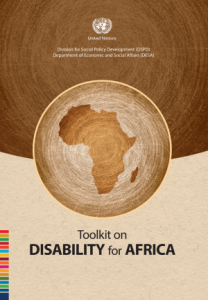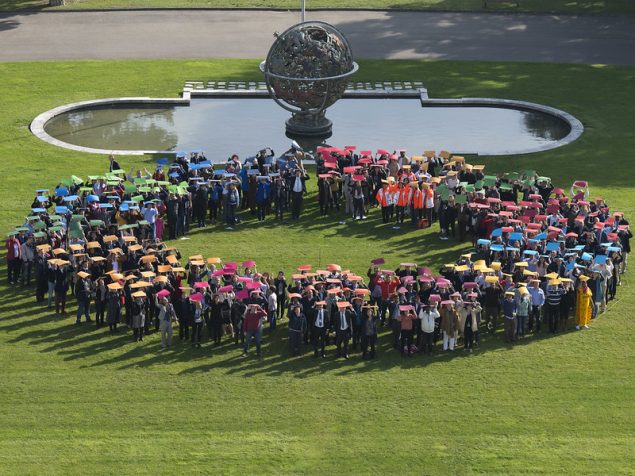The Economic and Social Council,
Report on the forty-sixth session (E/2008/26) [WORD]
Reaffirming that the Copenhagen Declaration on Social Development and the Programme of Action and the further initiatives for social development adopted by the General Assembly at its twenty-fourth special session, as well as a continued global dialogue on social development issues, constitute the basic framework for the promotion of social development for all at the national and international levels,
Recalling its previous resolutions concerning persons with disabilities and the relevant resolutions adopted by the General Assembly,
Acknowledging that the majority of the 650 million persons with disabilities in the world live in conditions of poverty, and in this regard recognizing the critical need to address the negative impact of poverty on persons with disabilities,
Also acknowledging that persons with disabilities, in particular women and children with disabilities, are subject to aggravated and multiple discrimination,
Convinced that addressing the profound social, cultural and economic disadvantage experienced by many persons with disabilities and that promoting the progressive removal of barriers to their full and effective participation in all aspects of development will further the equalization of opportunities and contribute to the realization of a “society for all” in the twenty-first century,
Welcoming the adoption of the Convention on the Rights of Persons with Disabilities and its Optional Protocol thereto on 13 December 2006 and the fact that since their opening for signature on 30 March 2007, one hundred and twenty-five States have signed and sixteen States have ratified the Convention and seventy-nine States have signed and ten States have ratified the Optional Protocol,
Recognizing the importance of the forthcoming fifth review and appraisal of the World Programme of Action concerning Disabled Persons, including its updating, to be conducted by the General Assembly in 2008,
Concerned that halfway through the target date of 2015, the situation of persons with disabilities has not been adequately considered, including in the discussions and reports on the internationally agreed development goals, including the Millennium Development Goals,
1. Calls upon those States that not yet done so to consider signing and ratifying the Convention and the Optional Protocol as a matter of priority;
2. Expresses concern about the persistent gap between policy and practice regarding mainstreaming the perspective of persons with disabilities, including their rights and well-being, in the work of the United Nations in realizing the Millennium Development Goals;
3. Encourages States, entities of the United Nations system and other members of the international community to take advantage of the range of international normative and policy instruments on disability, including the World Programme of Action concerning Disabled Persons,23 the Standard Rules on the Equalization of Opportunities for Persons with Disabilities, and the Convention on the Rights of Persons with Disabilities,21 in guiding their efforts to ensure that the issues related to persons with disabilities, including the perspective of persons with disabilities, are incorporated into the formulation of policies, the conduct of their mandate and missions and their budget allocations, aiming at the full and effective participation and inclusion of persons with disabilities in development, both as beneficiaries and agents;
4. Invites States, relevant United Nations entities, including the agencies, funds and programmes, regional and international financial and development institutions, civil society and the private sector, to take into account and include mainstreaming of the issues related to persons with disabilities, including the perspective of persons with disabilities, when developing their work strategies and action plans to promote the education and training of personnel so as to foster increased sensitivity, knowledge and skills in understanding how to address issues related to persons with disabilities in their respective mandates and work;
5. Requests relevant United Nations entities, including the agencies, funds and programmes, as well as regional and international financial institutions, to include issues related to persons with disabilities, including the perspective of persons with disabilities, when planning country offices in accordance with their mandates;
6. Urges States, relevant United Nations entities, including the agencies, funds and programmes, regional and international financial and development institutions, civil society and the private sector, to give priority to the promotion of full and productive employment and decent work for persons with disabilities, as a key factor in ensuring that persons with disabilities benefit from development on an equal basis with others, and fully enjoy all human rights, including the right to work, and the opportunity to gain a living by work freely chosen or accepted, including by providing access to education and training, access to microcredit schemes and entrepreneurial opportunities, fostering a labour market and work environment that is open, inclusive and accessible to persons with disabilities, and promoting inclusive employment and human resources policies and reasonable accommodation in the workplace;
7. Also urges States, relevant United Nations entities, including the agencies, funds and programmes, regional and international financial and development institutions, civil society and the private sector to promote the participation of persons with disabilities on an equal basis with others in decision-making and their involvement in the formulation, implementation and evaluation of strategies, plans and programmes pertaining to them;
8. Stresses the need to enhance the accountability of all actors, including at the highest levels of decision-making, in the work of mainstreaming disability in the development agenda, including in the assessment of the impact of development efforts on the situation of persons with disabilities;
9. Recognizes the strategic importance of complementing efforts towards the mainstreaming of the issues related to persons with disabilities, including the perspective of persons with disabilities, including while considering the allocation of resources;
10. Encourages all States, concerned intergovernmental organizations and international organizations, civil society, in particular organizations of persons with disabilities, and the private sector, to engage in cooperative arrangements that aim at providing the necessary technical and expert assistance to enhance capacities in mainstreaming issues related to persons with disabilities, including the perspective of persons with disabilities, in development efforts, and in this regard encourages the United Nations Secretariat and other relevant bodies to find improved ways to enhance international technical cooperation;
11. Encourages States to mainstream disability in poverty eradication policies and strategies to ensure their accessibility, and in this regard encourages the international community to provide support and assistance;
12. Urges all States, international and regional organizations and civil society, in particular organizations of persons with disabilities, to ensure that international cooperation, including international development programmes, is inclusive of and accessible to persons with disabilities;
13. Urges States, relevant entities of the United Nations system, including the agencies, funds and programmes, and invites international and regional development organizations and financial institutions, to take concrete measures to incorporate issues related to persons with disabilities, including the perspective of persons with disabilities, and accessibility requirements into development cooperation and development finance activities;
14. Requests the Secretary-General to prepare a report on the implementation of the present resolution for submission to the Commission for Social Development at its forty-eighth session.




